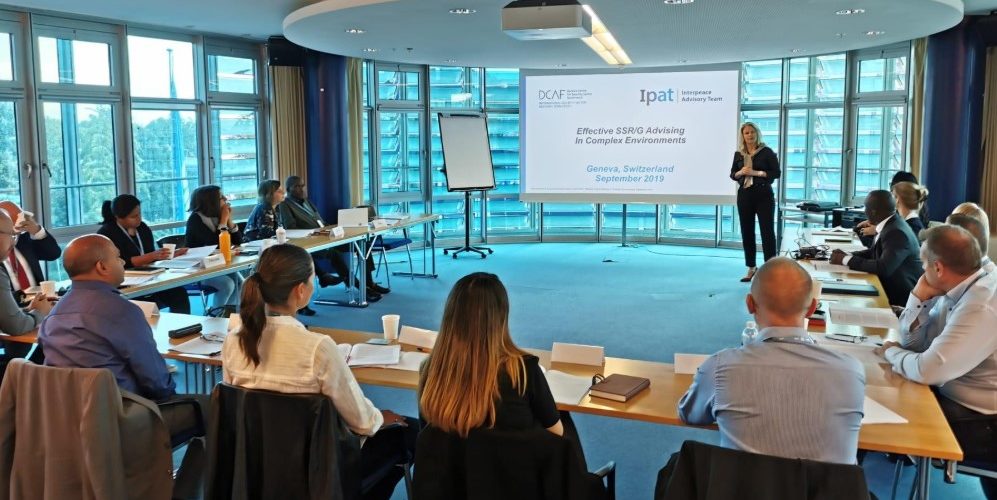23-27 September 2019
Course description
To build on the experience of both institutions, and in recognition of the acute need for enhanced advising skills amongst those supporting national SSR processes, Interpeace’s Advisory Team (IPAT) and DCAF-ISSAT will jointly deliver a five-day Course on SSG/R and Effective Advising focusing on national and international experts delivering advising assistance to Security Sector Governance (SSG) and Reform (SSR) processes in ‘peacebuilding’ contexts, countries which are emerging from cycles of violence and/or polarization that need to undergo social, political and institutional transformations to consolidate peace. This proposed collaboration stems from a common desire within the two organisations to make their expertise on advising in the context of SSR through one common channel more redily available.
The course will provide guidance and tools to assist participants in analysing their own advising roles, better understand their contexts of operation, and apply key frameworks for capacity development, change and inclusive governance to their own work cases.
Overall course objectives
The course intends to:
- Understand the challenges and opportunities for advising work in the context of the interaction between domestic and international actors in complex peacebuilding situations;
- Facilitate a nuanced understanding of the links between the three critical levels conditioning performance in advising functions: the personal/interpersonal; the professional/technical; and the socio-political;
- Enhance advising skills and approaches required for effectively supporting SSG/R Advisors in their roles fostering institutional reform, in complex peacebuilding environments;
- Identify key lessons and the latest trends from strategic and practical SSG/R Advising experiences;
- Develop personal and professional soft skills, competence and aptitude needed to initiate, foster and support locally-led and implemented SSG/R strategies, in complex peacebuilding contexts.
Course facilitators:
- Bernardo Arévalo de León is a Senior Peacebuilding Adviser with Interpeace-IPAT. He has wide experience in the design and implementation of peacebuilding strategies in complex contexts, including the design and implementation of SSR programs, and is an experienced learning facilitator.
- Nadia Gerspacher is a Senior Advisor with ISSAT, who leads ISSAT’s portfolio on professional development and training in the area of effective advising. She was formerly the Director of Security Sector Education programs at the Unites States Institute of Peace (USIP) Academy for International Conflict Management and Peacebuilding.
- Nora Refaeil is a Senior Associate with Interpeace-IPAT. She is an expert in transitional justice and peacebuilding, and has over twenty years of experience as an independent consultant, lawyer, mediator, facilitator and trainer. She has been a trainer in Interpeace-IPAT’s ‘Effective Advising in Peacebuilding Contexts’ courses since 2013.
- Natacha Meden is an Associate SSR advisor with ISSAT and an instructor for advising courses. She has extensive experience working with Ministries of Defense and Interior in Africa, teaching peacekeepers throughout Africa and in Asia. She has also served as an instructor for various advising courses to prepare both military and civilian advisors for mission around the world.
- Lt-General (Rtd) Marc Caron is a Strategic Advisor with ISSAT. Formerly the Head of the Canadian Army, he has served as the principle advisor on SSR to the SRSG in MONUC, the UN advisor to the President of Guinea Conakry on political and strategic matters, and worked on many missions with ISSAT providing advising services to a range of donors and multilateral organisations.
Target audience
The primary target audience is senior uniformed personnel fulfilling a role as SSG/R advisors at the strategic level, who work in or on conflict-affected contexts. The course will also consider other senior practitioners and professionals – civilian, military and police personnel, as well as civil society representatives and professionals from the private sector – who are working closely on issues related to Security Sector Governance and Reform in advising capacities such as governance, rule of law, police reform, defence reform, justice reform, disarmament, demobilisation, and reintegration.
The course is also targeted at those involved in programming, programme management, mission conduct and planning, and/or in political /policy dialogue. The organisers intend to select a highly diverse group of participants in terms of professional and organisational background, experience level and nationality, as well as with regards to gender balance.

